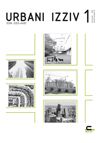Urban planning and transitional development issues: The case of Skopje, Macedonia
Urban planning and transitional development issues: The case of Skopje, Macedonia
Author(s): Janez Koželj, Jasna StefanovskaSubject(s): Social Sciences
Published by: Urbanistični inštitut Republike Slovenije
Keywords: urban planning; post communism; Skopje; transition; urban transformations
Summary/Abstract: Like many cities in neighbouring countries, the Macedonian capital Skopje has undergone radical changes that have affected urban planning processes for over twenty years. Over the past century, during which Skopje’s population has grown more than tenfold, social changes have not only affected planning processes but also impacted the built fabric of the city. As a result, the city has been transformed by a diverse set of dynamics. The last twenty years of Skopje’s development have been marked by a long and painful transition, a process through which the city has had to adjust to new complexities. The current crisis engulfing the city has led to deterioration in the quality of the built environment and has created fertile ground for speculative developments. It has become clear that urban planning is no longer able to operate as an instrument of control and development with the primary aim of protecting and promoting public interests. This article analyses the planning initiatives both before and after the 1990s, defining the main phases of transformation since the 1990s according to the key legislation, political factors and administrative decisions that have contributed to the urban transformations of the city.
Journal: Urbani izziv
- Issue Year: 23/2012
- Issue No: 1
- Page Range: 91-100
- Page Count: 10
- Language: English

